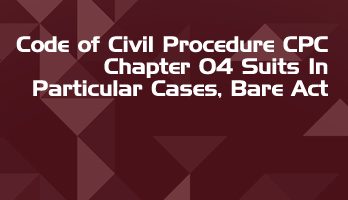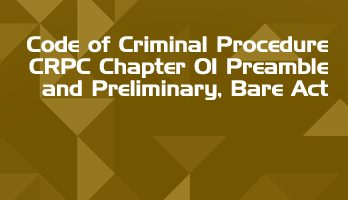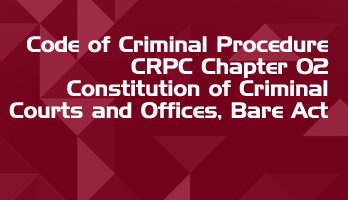Most acts are accompanied by 'subsidiary legislation' such as rules, regulations, notifications and orders; which address the actual implementation detail of the act.
Free Full Course Available on LawMint's YouTube Channel
How to Land Your Dream LLB Internship in a Top Law Firm
- Part 1 - Introduction
- Part 2 - Internship Planning
- Part 3 - Internship Research
- Part 4 - Building Your Profile
- Part 5 - The Email
- Part 6 - The Resume
- Part 7 - The Cover Letter
- Part 8 - The Interview
- Part 9 - Self Development
Practical and comprehensive course, with real examples and step-by-step analysis of the complete internship application process. Check out LawMint's YouTube channel now!
Code of Criminal Procedure, 1973
Chapter 36 – Limitation For Taking Cognizance Of Certain Offences
Provisions of this Chapter shall not apply to certain economics offences, see the Economic Offences (Inapplicability of Limitation Act, 1974 (12 of 1974), section 2 and Schedule.
Section 467 – Definitions
For the purposes of this Chapter, unless the context otherwise, requires, period of limitation means the period specified in section 468 for taking cognizance of an offence.
Section 468 – Bar to taking cognizance after lapse of the period of limitation
- Except as otherwise provided elsewhere in this Code, no Court, shall take cognizance of an offence of the category specified in Sub – Section (2), after the expiry of the period of limitation.
- The period of limitation shall be –
- six months, if the offence is punishable with fine only;
- one year, if the offence is punishable with imprisonment for a term not exceeding one year;
- three years, if the offence is punishable with imprisonment for a term exceeding one year but not exceeding three years.
- For the purposes of this section, the period of limitation, in relation to offences which may be tried together, shall be determined with reference to the offence which is punishable with the more severe punishment or, as the case may be, the most severe punishment.
Section 469 – Commencement of the period of limitation
- The period of limitation, in relation to an offence, shall commence,
- on the date of the offence; or
- where the commission of the offence was not known to the person aggrieved by the offence or to any police officer, the first day on which such offence comes to the knowledge of such person or to any police officer, whichever is earlier; or
- where it is not known by whom the offence was committed, the first day on which the identity of the offender is known to the person aggrieved by the offence or to the police officer making investigation into the offence, whichever is earlier.
- In computing the said period, the day from which such period is to be computed shall be excluded.
Section 470 – Exclusion of time in certain cases
- In computing the period of limitation, the time during which any person has been prosecuting with due diligence another prosecution, whether in a Court of first instance or in a Court of appeal or revision, against the offender, shall be excluded: Provided that no such exclusion shall be made unless the prosecution relates to the same facts and is prosecuted in good faith in a Court which from defect of jurisdiction or other cause of a like nature, is unable to entertain it.
- Where the institution of the prosecution in respect of an offence has been stayed by an injunction or order, then, in computing the period of limitation, the period of the continuance of the injunction or order, the day on which it was issued or made, and the day on which it was withdrawn, shall be excluded.
- Where notice of prosecution for an offence has been given, or where, under any law for the time being in force, the previous consent or sanction of the Government or any other authority is required for the institution of any prosecution for an offence, than, in computing the period of limitation, the period of such notice or, as the case may be, the time required for obtaining such consent or sanction shall be excluded.
Explanation – In computing the time required for obtaining the consent or sanction of the Government or any other authority, the date on which the application was made for obtaining the consent or sanction and the date of receipt of the order of the Government or other authority shall both be excluded.
- In computing the period of limitation, the time during which the offender:
- has been absent from the India or from any territory outside India which is under the administration of the Central Government, or
- has avoided arrest by absconding or concealing himself, shall be excluded.
Section 471 – Exclusion of date on which Court is closed
Where the period of limitation expires on a day when the Court is closed, the Court may take cognizance on the day on which the Court reopens. Explanation – A Court shall be deemed to be closed on any day within the meaning of this section, if, during its normal working hours, it remains closed on that day.
Section 472 – Continuing offence
In the case of a continuing offence, a fresh period of limitation shall begin to run at every moment of the time during which the offence continues.
Section 473 – Extension of period of limitation in certain cases
Notwithstanding anything contained in the foregoing provisions of this Chapter, any Court may make cognizance of an offence after the expiry of the period of limitations, if it is satisfied on the facts and in the circumstances of the case that the delay has been properly explained or that it is necessary so to do in the interests of justice.
Important Central Acts in Regional Languages
Legislative department website also features regional language versions of several important Central Acts.
Free Full Course Available on LawMint's YouTube Channel
How to Land Your Dream LLB Internship in a Top Law Firm
- Part 1 - Introduction
- Part 2 - Internship Planning
- Part 3 - Internship Research
- Part 4 - Building Your Profile
- Part 5 - The Email
- Part 6 - The Resume
- Part 7 - The Cover Letter
- Part 8 - The Interview
- Part 9 - Self Development
Practical and comprehensive course, with real examples and step-by-step analysis of the complete internship application process. Check out LawMint's YouTube channel now!












